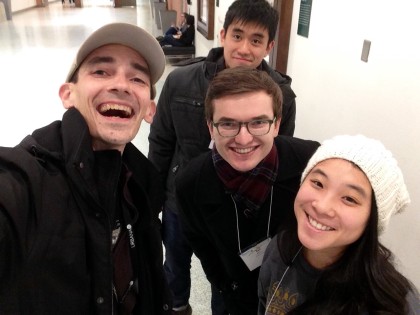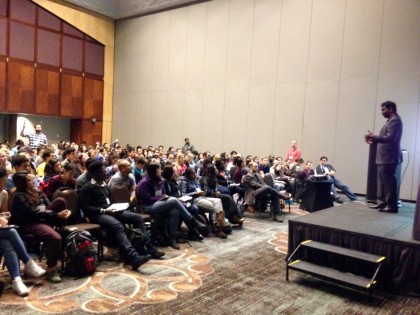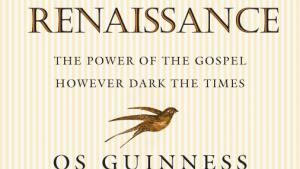As part of his Doctor of Ministry (DMin) in Ministry to Emerging Generations (Gordon-Conwell Theological Seminary), Tom's written a number of book responses and given several short presentations (personal and group). In this series he not only "shares the wealth," but also looks forward to your feedback as he refines his project: An argument for vocational discernment for graduate studies in the context of InterVarsity Christian Fellowship (Stay tuned to learn more!). For this particular post, additional material from Urbana15 has been included. Earlier posts on the program: Ministry to Emerging Generations and The Big Picture of Ministry to Emerging Generations.
Renaissance: The Power of the Gospel However Dark the Times
Despite the importance of the topic addressed by Os Guinness, I confess resisting "the call" to read Renaissance: The Power of the Gospel However Dark the Times (Downers Grove, IL: InterVarsity Press, 2014). One person shared with me that the publication was not "academic." Another could not stop reading, re-reading (3x), and talking about the book in a manner which led me to believe that I had heard it all before. Lastly, I am not excited about advocating a return to the "Renaissance” for the Church, Christian culture/subculture, and/or "Christian" civilization. But required reading prompted me to order, read, and reflect upon Guinness’ short piece. Despite my hesitancy, Guinness quickly engaged me with the big picture:
There is no shortage of analyses of the twin crises of the church and the West, but by themselves such analyses have too often led to despondency, fear and paralysis, just as medical diagnosis without remedies can be heartless and debilitating. What we also need is a constructive overarching vision of Christian engagement in today's advanced modern world, one that is shaped by faith in God and a Christian perspective rather than by current wisdom, and one that can inspire Christians to move out with courage to confront the best and worst that we may encounter (27).
Furthermore, I appreciated that although he was not going to die on the hill of defending the use of the term “Renaissance,” his inspiration for the use of the term was its definition as “rebirth” and not a convoluted return to the Renaissance era (28-29) or an ideal version of Western Christian civilization. Yes, “Christendom” truly requires rebirth and by God’s grace we have seen this occur previously through the Christian worldview actively lived, i.e., incarnation (75, 86).  “The time has come to pray and act” (48). In preparation for the Urbana Student Missions Conference (December 27-31, 2015), I sensed the urgency for the Emerging Scholars Network (ESN) to wrestle with and shape material which interacted with InterVarsity's vision:
“The time has come to pray and act” (48). In preparation for the Urbana Student Missions Conference (December 27-31, 2015), I sensed the urgency for the Emerging Scholars Network (ESN) to wrestle with and shape material which interacted with InterVarsity's vision:
To see students and faculty transformed. Campuses renewed. World changers developed.
The concept of Renaissance--with the focus upon “rebirth” and “incarnation”--engages students, faculty, and campuses. At Urbana15, I enjoyed
- sharing material from Renaissance (including critiques of Christian engagement with Western culture and the modern era),
- interacting with students who have a Renaissance passion, including ~ 60 students participating in an ESN Urbana Sponsors/Scholars program,
- giving students a culture building task at Urbana, to learn more visit Posts on Mission, Justice, and the University from Urbana 2015 and The Secular Academy as a Mission Field: Urbana Panel Discussion,
- praying and commissioning Emerging Scholars involved the prayers from the end of Chapters 1 and 2 (30, 51), and
- sending students forth to engage in deeper resource building/networking as followers of Christ in higher education.
Honestly I could not believe how quickly some of the students embraced the call and took next steps by gathering for lunch to interact with staff such as myself. Several created an online forum (with survey) not only to debrief Urbana15, but also to explore inter-campus dialog and provide input for Urbana18. Some of the Renaissance stories, with more to come . . .
- Connecting with ESN has really enriched my experience at Urbana because it expanded my mind to see that God called me into the engineering field for a reason. Missions and academic/vocational pursuit are not two separate ideas, but rather beautifully intertwined to fulfill a piece of God's bigger story for my generation. It's really quite exciting! I walked away with a desire to excel in the secular arena because of the agenda of the sacred.
 The seminars Women in Academia and God's Global Mission and Graduate School were really helpful to me in very personal ways. They reminded me that attending graduate school is a privilege and God has called me to be here. They also reminded me that being a committed Christian does not necessarily mean devoting to full-time vocational ministry. God has made me who I am and has given me these passions and abilities. I can participate in his global mission where I am, being who I am. I found my place in Urbana, and in God's plan for the world.
The seminars Women in Academia and God's Global Mission and Graduate School were really helpful to me in very personal ways. They reminded me that attending graduate school is a privilege and God has called me to be here. They also reminded me that being a committed Christian does not necessarily mean devoting to full-time vocational ministry. God has made me who I am and has given me these passions and abilities. I can participate in his global mission where I am, being who I am. I found my place in Urbana, and in God's plan for the world.- ESN has immensely benefited me in so many ways. From helping to show me evangelism opportunities that are out there as a "missional" professor to teaching me that the even Jesus is supreme in the world of Science and that with his strength I should never be afraid.
- I felt my ear burning as I sat here. I'm totally grateful for this seminar. This is [the] Lord's calling for me. I should be a professor. -- Response card to The Secular Academy as a Mission Field: Urbana Panel Discussion
On my flight back from the Urbana Student Missions Conference, which included several interactions with missionaries, I realized that under God's direction I had engaged in conversation after conversation with opportunity to break the fear, paralysis, and polarization by which we find ourselves surrounded on campus. Furthermore, I was reminded “ideas spread best through networks, rather than through either individuals or institutions” (100). Truly a work of the Spirit of God among future leaders at cultural centers. In 2016, I look forward to participating in the Emerging Scholars Network's development of additional resources to offer a more in depth consideration of this model, in particular the tension between following Christ and engaging in Renaissance as a cultural leaders. As you have insights, please be in touch. What a joy to have you part of the growing network/team. To God be the glory!
High King of heaven, Lord of the years and sovereign over time and history, grant to us such an overpowering knowledge of who you are that our trust in you may be unshakable. Grant to us too a sufficient understanding of the signs of the times in which we live that we may know how to serve your purposes in our generation and be more truly be your people in our world today. To that end, O Lord, revive us again and draw us closer to yourself and to each other. Where there is false contentment with our present condition, sow in us a holy restlessness. Where there is discouragement, grant us fresh hearts. Where there is despair, be our hope again. For your sake empower us to be your salt and light in the world, and thus your force for the true human flourishing of your shalom. In the name of Jesus, Amen. -- From Os Guinness. Renaissance: The Power of the Gospel However Dark the Times (Downers Grove, IL: InterVarsity Press, 2014), 30.
Originally published as Book Response: Renaissance, by Os Guinness on the Emerging Scholars Network Blog.



 “The time has come to pray and act” (48). In preparation for the
“The time has come to pray and act” (48). In preparation for the  The seminars
The seminars